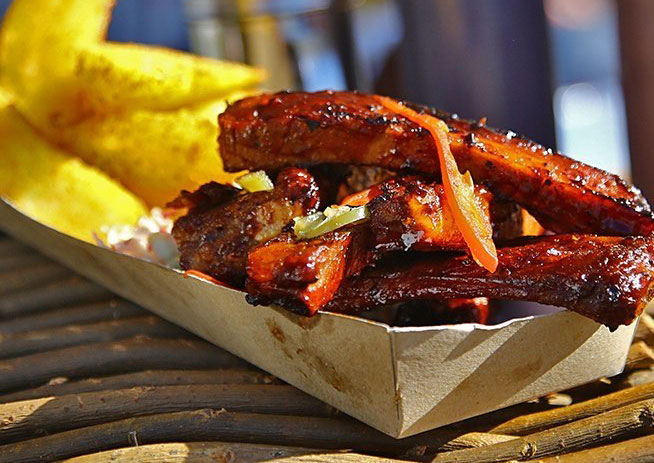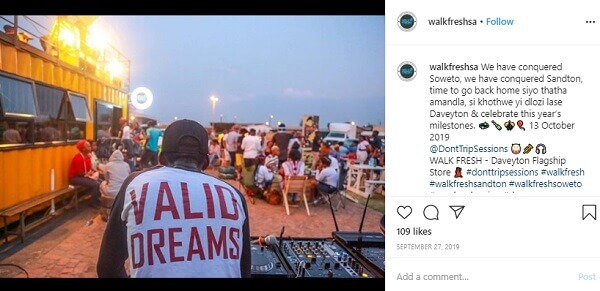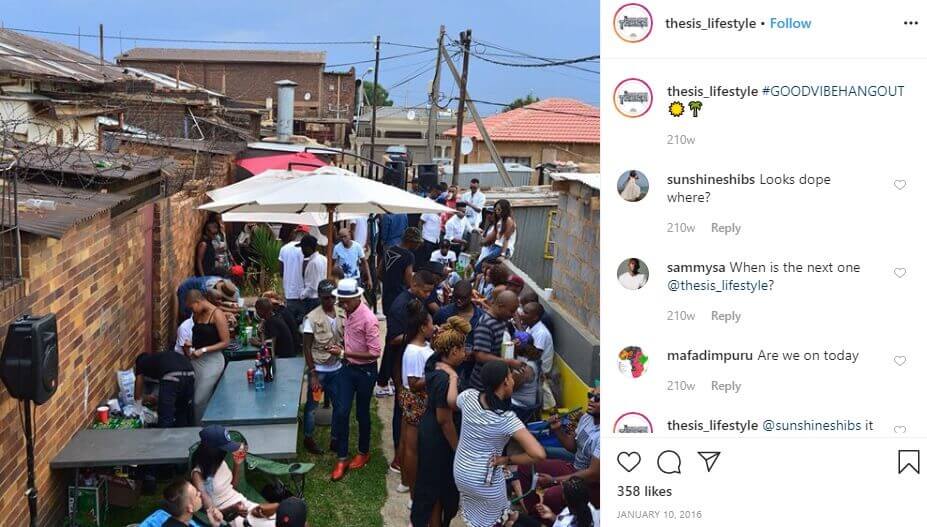South Africa’s townships have always been a hive for entrepreneurial activity, however the over-saturation of certain sectors has affected the chances of their success. These are typically sectors with low barriers to entry and low capital requirements.
This is beginning to change as more entrepreneurs look to launch businesses in previously under explored sectors which could give rise to the next million-rand enterprises.
Kabelo Selebalo, founder at Menzion Digital, a Ekhurhuleni-based design and development agency that services township-based businesses, says that many of these trends are being driven by young upwardly mobile black professionals who are seeking greater convenience and service.
Starting a business is always a risk, but pursuing one of these promising sectors can improve your odds. Selebalo shares “promising sectors” township entrepreneurs should consider stepping into.

1. Food markets
Social events have moved outdoors with food markets being the leading contender in this market.
The market trend has caught on in many townships across the country, with many entrepreneurs launching their own food markets or cookouts catering for that market.
These entrepreneurs are catering to a young and trendy crowd that is increasingly looking for authentic experiences – think food, fashion and music.
The growth of this trend has also meant that major brands are looking to partner with such events.

2. Towing services
The township market is beginning to see the emergence of new players in the towing service business. While still in its infancy, if you have expertise in the space now is the perfect time to jump in before the market becomes oversaturated.

3. Kasi mini-complexes
Rental accommodation in the township is evolving to the accommodate the young, working class looking for the privacy and amentities that complexes in urban areas offer, without leaving the township.
These complexes typically take the form of simple bachelor or one bedroom apartments (usually no more than 20 units) in a gated property, and some are even equipped with Wifi.
The demand is being driven by cheaper rent prices (as compared to urban areas), as well as convenience. We are likely to see more growth in Kasi mini complex mostly around townships not far from areas such as Soweto and Tembisa.

4. Laundry services
On demand services continue to be a rising trend. The township marketing is embracing this trend in the form of laundry services.
Just like the kasi complexes trend, the laundry service trend is being driven by the quest for greater convenience, mostly by millennials.
This market has grown significantly in the past few months with companies in this space growing their offering and are starting to add a delivery option with branded vehicles.
5. Bakery
Josephine Mokgwasa, owner of Mokgwasa Creations, started her bakery in January last year in Kagiso township in Krugersdorp after completing a five-week baking course. In additional to baking for her customers, Mokgwasa also hosts cake tastings on a weekly basis, not only to introduce a new product to her customers, but also for recipe development.

Mokgwasa uses a Qhubeka bicycle, which she has received from a bike project by the Qhubeka, a non-profit company, to deliver smaller cakes and an Uber to complete big deliveries on time.
She says the target customer for her bakery includes individuals hosting events such as weddings, funerals, parties, gala dinners and also office workers. Mokgwasa says location for her township-based business is important. She also sells her products at fuel stations to take advantage of the foot traffic.
Mokgwasa says her setup costs were R10,000. This included equipment such as an oven, dough mixer, fridge, scale, silver steel butcher table, and a cake counter.
6. Youth Entertainment
– Pop-up movies
Guests of Mamovie get to experience a low-budget cinema feel when they attend Kutlwano Tlhapane’s pop-up movies and popcorn in Kagiso.
To establish Mamovie, Tlhapane had to access the following equipment: a PC with internet access, a 1080hp resolution projector, a popcorn machine, a bicycle, a foldable plastic table, extension cords and plugs, an anti-theft bag, and a white screen (big white fabric is used).

Tlhapane says she uses Facebook and WhatsApp to market her events because they are more cost-effective. “Posters and pamphlets would be used sparingly to market a pop-up movie day over a long period of time until the day [of the event]. I would also make use of the community radio station [to advertise].”
Currently, the prototype stage of movie screenings take place at home in the garage. “In the long term, I wish to have movie screenings in the primary schools of Kagiso, it’s a way for the schools to fundraise and for me to have a sustainable business,” says Tlhapane.
– Cycling events
Boni And Bike, a cycling events organisation founded by Doctor Mofokeng, offers bike-riding lessons and hosts monthly social rides for local residents of the Kagiso community as well as tourists.

The organisation recently partnered with enke: Make Your Mark, a youth development organisation, Investec, the international specialist banking and asset management group, and Qubeka, a bicycle project, to launch a small bicycle repair shop, which runs from Mofokeng’s garage. “We were granted with essential tools and spares to kick start the workshop,” he says.
Mofokeng says they own two Mountain Bikes. “One of our biggest challenges is the availability of bicycles to run our initiative effectively, we always have to hire bikes from a supplier in Soweto.”
– Collaborative events
Several township-based entrepreneurs spoke to SME South Africa in previous interviews about how they have collaborated with others to host events in their communities. These events help to generate brand awareness and provide an additional income stream for their businesses.
Coffee shop owner, Sikelela Dibela of Siki’s Koffee Kafe of Khayelitsha in Cape Town says he regularly hosts events in collaboration with other entrepreneurs in his community. “For example, I hosted a ghetto session with a friend for a community-based poetry event – this was to connect people to one another.”

Lethabo Mokoena, founder of a shoe- and sneaker cleaning business, Walk Fresh, says they often host events with a classic township backdrop. “We also have our own bi-monthly event, ‘Don’t Trip Session,’ that we host at the shop which is a music session centered around exploring alternative sounds,” explains Mokoena.

Mokoena says Walk Fresh has also been invited to business events and local soccer tournaments, to exhibit their services.
The well-known street clothing brand, Thesis Lifestyle’s founders added events to their brand in 2009. They host events like Thesis Social Jam Session where local, unsigned artists and comedians were given a platform to showcase their talent.

7. Creative arts
The owner of Blvck Lupé Arts and Couture, Sibongile Ntamane, is an artist who specialises in wall art, wall painting, photography, illustrations, henna tattoo and customizing clothes (painted by hand).
“I started my business because lot of people love art, they love to have their own sketched portraits so I wanted to meet their wants and to set an example to other artists that you can go big with art,” says Ntamane.
Ntamane says he started his business with art supplies and a camera. His target customers are art galleries, schools, hotels, clubs, parties and individuals. Ntamane says he does online marketing to promote his business.
Tourism-related business ideas
Sifiso Moyo, founder and CEO of lifestyle retail outlet, The Box Shop, says tourism services which are in demand within townships are shuttle services, tour operators, and of course, accommodation. “I don’t think there is enough of Airbnb’s here.”
Moyo also gave a list of tourism-related opportunities that he foresees will take off in townships:
8. Bookings
Moyo says that there are locals in the area that explore outside their community, so there are opportunities for entrepreneurs to create packages to assist them to travel outside of the location.
9. Shopping tourism
Moyo also says that they hope that The Box Shop, which is based in townships is known for as the go-to place to buy African wear. “If you look at Dubai, people go there to buy.”

10. AIRBNB Experiences
Airbnb Experiences arrived in Cape Town in 2017 and rolled out in Johannesburg in 2018. Locals get the opportunity to be the “expert” showcasing cultural activities, with experiences centred around food, fashion or physical and cultural activities.
There are experiences from Township Tour Walking in Cape Town, and urban farming in Johannesburg, to cooking classes in Durban and photo shoots in the Bo-Kaap in Cape Town, as well as partying in a township in Khayelitsha in Cape Town and sand boarding in Port Elizabeth.
11. Delivery or courier services
Food deliveries became popular during the COVID-19 pandemic in 2020. This is as the lockdown, which had been put in place in March 2020, encouraged more people to start shopping online.
We’ve seen some entrepreneurs take advantage of the digital trend and begin to offer courier and delivery services. From groceries and takeaways to chronic medication delivered on bicycle – there has been no shortage of innovative ideas. Other creative spins to this business model includes mobile spaza shops, personal shoppers and the use of apps, such as Zulzi On Demand or Bottles.
12. Drive-by Family Portraits
During the lockdown period photographers became innovative by providing at home family photo shoots. With more people looking to social distance and stay at home, innovative photographers are finding unique ways to offer photography services. An example of this is photographer, Daniela Zondagh, who arranges photoshoot via WhatsApp. Zondagh rings your doorbell and positions herself at a safe distance and takes pictures once you are ready.
13. Rent your business assets
If you are sitting on electronics or appliances that you are currently not using, make money by renting them out. This is possible through Rentoza, an online rental company. With more people working from home and many facing retrenchments, there is a greater need for affordable office equipment to use at home. Your appliances can also be used by other businesses that have adapted to remote working models.
14. Digital consultations or online classes
Offer skills coaching, peer-to-peer tutoring, online learning or online personal training to the less tech savvy. This can be done via apps like WhatsApp, Zoom or over video conferencing platforms.
15. Internet café
With many people working from home, some might need time away from their family members and may opt to work from an internet café instead. Job seekers can also make use of the café to update their CVs.
Article Courtesy of SME South Africa’s
This article forms part of SME South Africa’s Township Entrepreneurship series. This article was originally published in October 2018, due to its popularity it’s been updated with brand new township business ideas in South Africa by Melissa Javan on 1 February 2021.